EDITORIAL COMMENT: Afrophobia must not detract from Summit

Zimbabwe on Monday this week experienced one of the severest power outages in a long time, that left only Bulawayo with power. The outage should be a wake-up call, coming as it did, on the eve of the sadc Extraordinary Summit taking place today in Harare, a summit to discuss industrialisation.
The power blackout, which covered most parts of the country, should have a salutary effect on the summit, whose theme centres on industrialisation and regional integration.
Salutary effect in that following the recent outbreak of Afrophobia in South Africa, that issue may compete for focus at the summit.
Indeed, South African President Jacob Zuma told South Africans during Freedom Day celebrations at Union Buildings in Pretoria that he would raise the issue of attacks on African immigrants in a formal report to sadc, the African Union and the United Nations.
While the South African leader condemned the attacks on immigrants, he appeared to fan the flames of xenophobia by blaming fellow African countries whose citizens migrate to South Africa.
While his comments were reprehensible and regrettable in light of the barbaric attacks on foreigners, President Zuma also unwittingly raised important questions, questions that should be answered at the Extraordinary Summit.
He asked why African immigrants were flocking to South Africa, why they were not in their countries, and why South Africa was being criticised as if it manufactured immigrants only to abuse them?
Migration occurs in every part of the world, and at times is not even a manifestation of deficiencies in national economies.
There are always push and pull factors.
South Africa cannot afford an attitude of “splendid isolation” and smugness about the state of its economy in a sea of poverty and unemployment.
It should feel very uneasy when such a big economy fails to deliver jobs for its people.
It is, however, a fact that faster regional integration and balanced development in all parts of the continent would reduce the number of people migrating to South Africa in search of opportunities.
He said; “The promotion of intra-Africa trade, regional integration, infrastructure and other economic interventions is also designed to improve the economic situation in sister countries. The end result will be that brothers and sisters will eventually no longer need to leave their countries in search of a better life” in South Africa.
sadc leaders have acknowledged the need for employment creation in the region through beneficiation and value-addition of products instead of exporting them in their raw state.
They acknowledge that this calls for massive investment in infrastructure, skills, energy, road and rail networks as key enablers to speed up development.
The power outage of Monday highlights the resource limitations of each country trying to go it alone on such massive projects, not to mention that there is already a major energy deficit in the region.
These are the long-term challenges confronting the region which should command the attention of sadc leaders meeting in Harare today.
South Africa’s ability to export more to the region because of the declining value of its currency is not sustainable.
If anything, it creates resentment because it undermines the manufacturing sectors of neighbouring states, hence the loss of jobs.
It is, therefore, our considered view that the recent outbreak of Afrophobia in South Africa should not be allowed to divert the attention of leaders from the theme of the summit.
They should act as a spur to practical measures needed to develop the continent.
They should not be taken as cause for criticism or mockery of each other but as a reminder, if any were required, that Africa’s development agenda is lagging too far behind and breeding mutual animosity among its underclass and unemployed youths, leading to Afrophobia.
Even South Africa cannot escape the ghost of economic inequalities by clinging on to the legacy of apartheid.
It is time to rebuild economies which address African challenges beyond impressive GDPs which serve alien, minority interests.







Comments